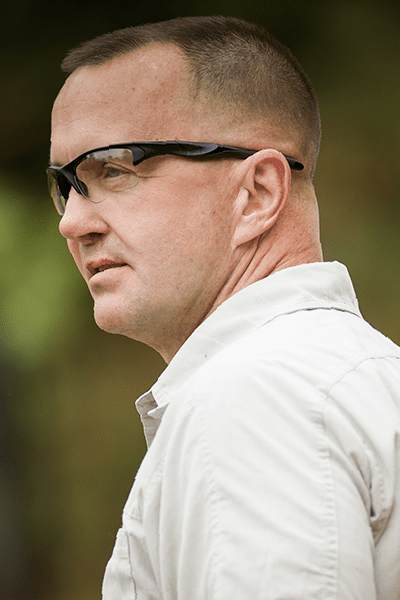Including ... Putting Training into Context: An Interview with John Murphy • President’s Message • Attorney Question • Book Review • Editor's Notebook • About this Journal
Get eJournal PDF: click here
Putting Training into Context:
 An Interview with John Murphy
An Interview with John Murphy
by Gila Hayes
A new voice is making important contributions to the world of practical firearms training. John Murphy now offers his Street Encounter Skills classes, once an east coast training opportunity at FPF Training, at a number of host facilities nationwide. He taught at the range next door to me a couple of months ago, providing the perfect opportunity to sit down and explore threats, defenses and training for today’s world. I think you’ll enjoy his observations, so we switch now to Q & A format and share some of our conversation.
eJournal: I keep running across the term “contextual training” in reference to your work. How does that differ from most training for armed citizens?
Murphy: It is a much more holistic approach which takes into account the average citizen’s everyday environment. People have interactions with other people all the time. Some are pleasant ones, and then some are less pleasant, and if we are not careful, “unpleasant” can become criminal. You have to understand a bit of psychology, a bit of what you are projecting. I would love to claim that this is all original work, but I have drawn it from so many that I am hesitant to start listing them for fear of missing somebody. I absolutely stand upon the shoulders of giants.
President’s Message
Purpose
by Marty Hayes, J.D.
Purpose. It is such a simple word, and we all know what it means, but applying it to our lives can be a little more difficult. Driving from WA to AZ this week has given me some uninterrupted time to think about my purpose here on this earth.
Attorney Question of the Month

The last edition of our online journal discussed carrying intermediate self defense options in addition to a gun or when not carrying a gun. State laws can impose restrictions on possession or use of pepper spray, TASER®s, force multipliers like Kubotans and even hand-to-hand defensive tactics, but those laws vary from state to state.
Book Review
Spotting Danger Before It Spots You
By Gary Dean Quesenberry
YMAA Publication Center (June 1, 2020)
https://ymaa.com/publishing/book/spotting-danger-it-spots-you-build-situational-awareness-stay-safe
172 pages, 6x9 softbound
$18.95 paperback; $9.99 eBook.
Reviewed by Gila Hayes
At least once a year, I like to refresh my threat detection skills, get input on emerging risks, and learn some new ways to make decisions based on all the visual, audible and the more subtle inputs our busy world provides. After all, what good is any of our skill training if we don’t see danger before it strikes? In September, I turned to Gary Quesenberry’s Spotting Danger Before It Spots You and liked its phased learning and workbook approach.
Editor’s Notebook
To Encourage Law Breaking
by Gila Hayes
That’s the reality in calls and messages telling the Network to open up the Legal Defense Fund to pay legal expenses if a member knowingly breaks laws restricting gun possession then uses their gun in self defense. As responsible stewards of the Legal Defense Fund, we have to compare calls for us to pay those legal expenses against requests to fund legal defense if other laws are violated during an incident of self defense.
Where, on this slippery slope, are we to draw the line? Consider parallel requests to join the Network from applicants with felony convictions, some from the War on Drugs, felony DUI or past domestic violence.
About this Journal

The eJournal of the Armed Citizens’ Legal Defense Network, Inc. is published monthly on the Network’s website at http://armedcitizensnetwork.org/our-journal. Content is copyrighted by the Armed Citizens’ Legal Defense Network, Inc.
Do not mistake information presented in this online publication for legal advice; it is not. The Network strives to assure that information published in this journal is both accurate and useful. Reader, it is your responsibility to consult your own attorney to receive professional assurance that this information and your interpretation or understanding of it is accurate, complete and appropriate with respect to your particular situation.


